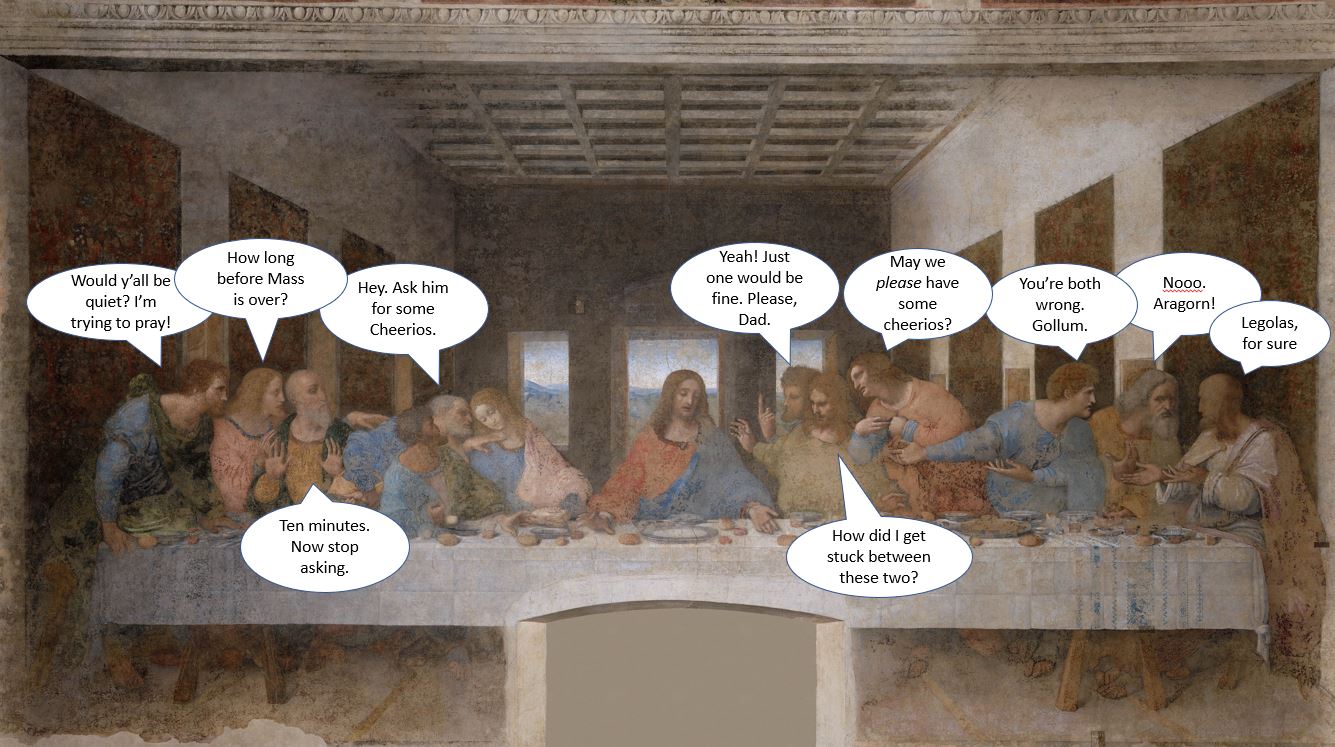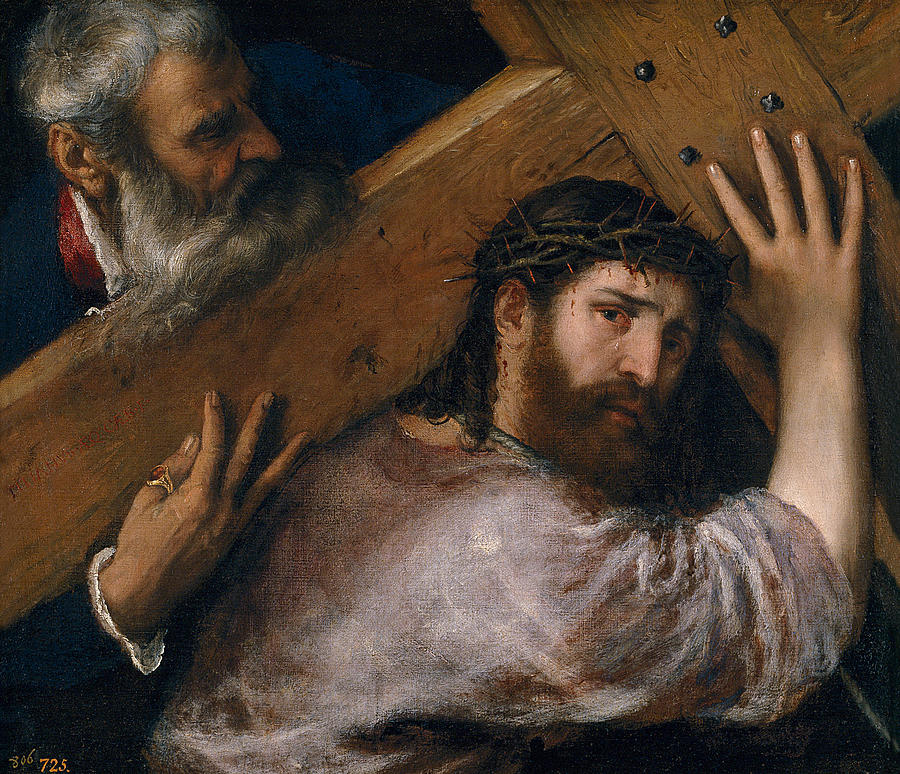Unlike your favorite cooking blogger who buries her recipe for “Mom’s Easiest Baked Potato” after a lengthy review of her family history, I’ll give you the answer here at the top: HOLINESS.
God wants you to be holy {context}.
Before you run off to join a monastery or quit your job to take on volunteer work, wait for the context.
God wants you to be holy right where you are. For those unhappy with where they currently are, staying might be the answer you’ve been trying to avoid. Of course, leaving may also be an answer, but more on that later.
These past few days, I was enjoying an annual silent retreat for men at a nearby conference center. If you haven’t been on a silent retreat recently (or ever), please consider going.
As a man, it’s hard for me to justify purchasing or doing something that doesn’t have an obvious practical dimension. A stereotypical example is throw pillows, which seem to get their name from simply being thrown on the floor when not adorning a bed. I don’t find car washes particularly useful especially if I must drive to the car wash. A good friend of mine swears by purchasing whole milk which is double the price of the store brand whole milk, while I can taste no difference at all between the two.
Retreats can mistakenly be fitted into the impractical category. They cost money and, if you have small children at home, leave one parent watching the kid(s) while you are off “relaxing.” (Men – if you feel this way, or if your wife has explicitly said this to you, consider signing her up for a retreat in secret, then telling her she’s going after the fact. She may fight you, but she will be grateful. I can almost guarantee it).
But we regularly invest much more time and money into pursuits that do not bring us closer to God. Why? Well, we’re imperfect. And shortsighted. We’re like children pining after candy and ice cream all day failing to realize that to adopt such a diet would lead to an early death.
Practically speaking, the most important thing we can do is watch after our immortal soul and, in turn, the souls of those we love, for “what profit would there be for one to gain the whole world and forfeit his life?” (Mt 16:26).
Knowing that “the Son of Man will … repay everyone according to his conduct” (Mt 16:27), it appears to me to be the height of impracticality to disregard the health of my soul. Therefore, I go on yearly retreats. You should, too. No money? Either scrimp for a year forgoing little pleasure purchases, or ask for help. Scholarships are often available.
No one to watch the kids? Ask a friend, family, or your parish. The point I’m trying to make with all of this is that we own our path to holiness, not God. In His infinite goodness, He has given us the ability to pursue him, or not. We’re only hurting ourselves when we make excuses.
We have to be serious about our souls. We fear death and try to eke out a few extra years through all kinds of expensive treatments or lifestyle choices, but in the end, everyone’s body will fail. Worse yet, we don’t know when that end will come. Our soul, however, lives forever, and the decisions we make now will determine our soul’s final destination. While I’m teetering on the edge of severity here, I want it to be clear: your soul’s health is paramount.
Anyway… all of that is to get to the real purpose of this post: what to do when faced with the sometimes paralyzing state of “discerning God’s will.”
Recalling where all of this started, God’s will is that we should be holy. As the Saints have demonstrated, how we accomplish that feat is largely up to us. It will require the charitable use of the talents God gave us, as well as a fair bit of wrestling with our defects. Put another way, it’s going to be difficult. That’s OK. The stakes are pretty high, so we should expect challenges.
As I was reflecting on this during my retreat, I spent a long time thinking about optimization. We are being conditioned to find the best in all aspects of life. Consider the strictures we place on something like managing our health! Hawking ingredient labels for all the dangerous buzzwords: carrageenan, nitrites, yellow-5 (maybe?), etc. Is it non-GMO? Is it organic? How organic is it? Is my chicken free-range or cage-free? Does my water have too much ammonium hydroxide in it? Are my home filters cleaning enough impurities? Does my car generate too many VOCs? Am I getting enough omega-3s? -6’s? Or a good ratio of the two?
What a blessing to live in an age where information is so readily available, but there are obvious dangers that go along with it. Namely, we can easily lose sight of what’s most important and instead get distracted by a million different worries – worries that we likely didn’t have 40 or 50 years ago, and almost definitely didn’t have 100 years ago. Yet with all this information, we know so much less about ourselves.
My challenge to you is this: our always-on world is killing us, and not just physically. Our Lord (Mt 10:28) says, “And do not be afraid of those who kill the body but cannot kill the soul; rather, be afraid of the one who can destroy both soul and body in Gehenna.” Our immortal and everlasting soul gets knocked down the priority list in favor of temporal pursuits and perishable goods.
Life is not easier as a result, but much more difficult. As I said in a previous post, we are far less happy now than we’ve ever been. The grip we have on who we are and what we’re here for has slipped further away. it stands to reason, then, that restoring our priority list would restore our happiness. When I refocus my life on my divine filiation and call to holiness, I feel as though a great weight has been lifted from my shoulders.
Going back to the Saints, I remember again that the path to holiness is unique for each of us. At this point in life, is there likely one path that is best for me to take? Yeah. I’d say that makes sense. Am I likely to find it? No. Pretty darn unlikely, I’d say.
But does that mean there aren’t other paths that are nearly as good? No! There are likely hundreds or thousands of routes I could take to holiness at this point. What a relief! Why, then, do I bother sweating this decision or that decision? Am I choosing between an objectively good and an objectively bad decision? Then it’s an easy choice.
Am I choosing between two or more objectively good choices? Perhaps that’s a bit more complicated, but it needn’t be. In such a case we consider the nuances of each decision and then choose the one we want. God, as our Good and Perfect Father, is excited to see His children using the gifts He gave them to make their own decisions. Of course, this requires the ability to see that something is objectively good, neutral, or bad, which presupposes a well-formed conscience. I am not advocating for doing what you like, when you like, and how you like. Rather, I’m advocating for taking the stress out of decision-making.
Let’s take an example: you don’t like your job. Now, quitting your job without a backup plan is an objectively bad decision. Your wife and children need you, and unless the environment is downright abusive, it’s best to stay put. But what if you apply for a few jobs, get interviews, and then hear back from two employers?
All parents know this feeling. Telling our kids how to do something results in a dramatically different feeling than watching them take control and do it themselves. While we Christians know that we have nothing and can do nothing without God, we also know that God is greatly concerned with effort (a matter of the heart) and not the outcome. Consider the parable of the generous landowner who paid out equal wages to all those who came to work, regardless of when they showed up; or the parable of the talents – the one given fewer talents produced less, but still did what he could with what he had.
So, too, are we asked to do what we can with what we have, and God will fill in the rest. For me, this is a great relief. Really! Internalizing this notion that success doesn’t depend on me is a powerful motivator for unlocking potential. There’s no way I can accomplish great things alone, so why bother? But if I include in my calculus the great numerator that is God, what can’t I do? In his little book The Way, St. Josemaria speaks to this directly:
471 “In your apostolic undertakings you are right – it’s your duty – to consider what means the world can offer you (2 + 2 = 4), but don’t forget – ever! – that, fortunately, your calculations must include another term: God + 2 + 2…”
473 “Forget that despair produced by the realization of your weakness. True: financially you are a zero; in social standing another zero; and another in virtues; and another in talent. But to the left of these noughts stands Christ. And what an incalculable figure we get!”
I am reminded of the reason the priest puts a couple of drops of water into the chalice before the consecration. This meager addition is meant to represent our contribution in life. Ironically, what does it do? It waters down the richness of the original cup! If anything, our contribution makes things worse, but it is precisely what God asks for from us. Our littlest addition is a source of great joy for Him, and it is precisely what we need for Him to work his grace into the fabric of our lives.
So when you’re faced with big or small decisions, remember: all that is required of me is my effort. I don’t need to stick the landing. Pray, hope, and don’t worry.
In One Word, What Does God Want from You?


Jonathon Trousdell
Husband to Trina and a father five times over to Lily (9), Teresa (7), Henry (5), Joseph (2), and Maryjoy ( 1). Enjoys oatmeal, the wisdom of the saints, woodworking, and finding new defects in himself which need to be corrected. St. Joseph, pray for us!
Now on X! But nothing else…



